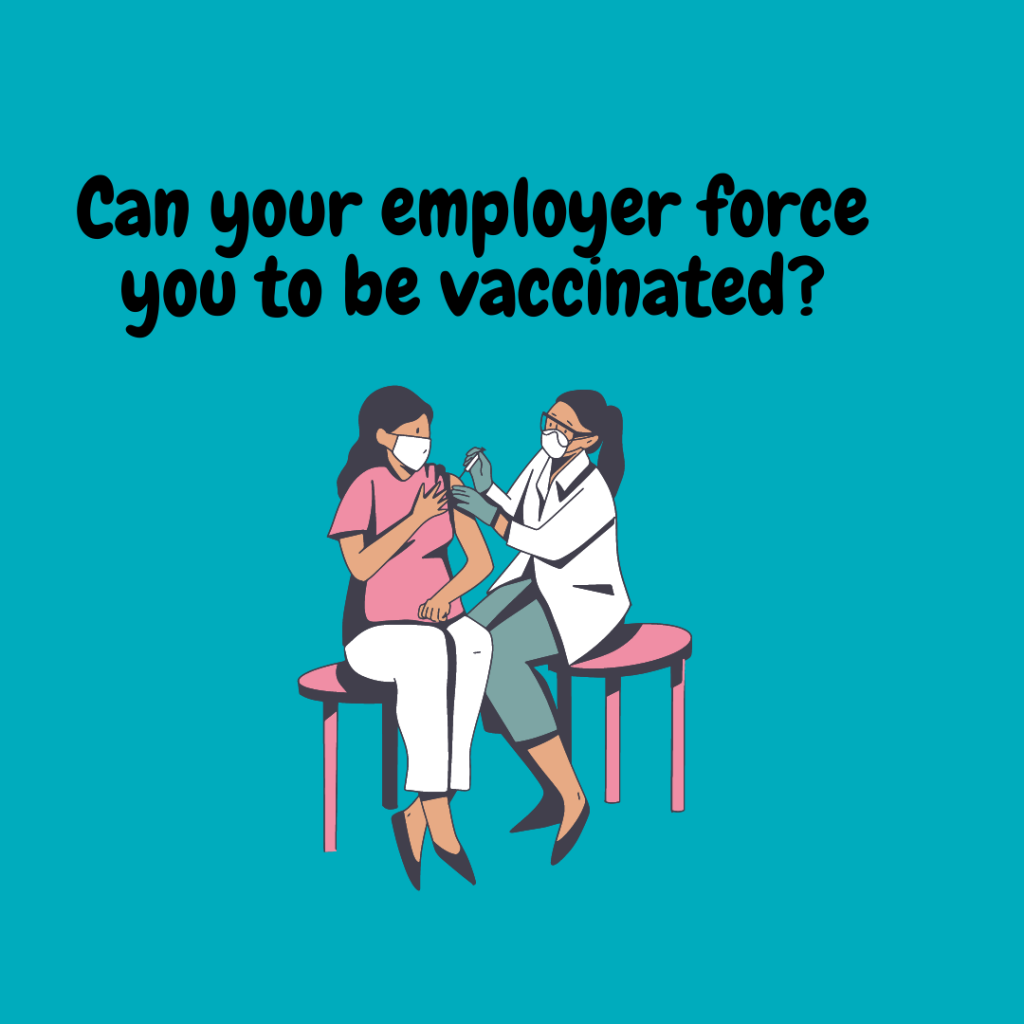
Updated to 27 August 2021
The short answer is no, your employer cannot force you to receive a COVID-19 vaccination or take a COVID-19 test against your will. However, your employer has a duty to ensure, so far as is reasonably practicable, your health and safety and the health and safety of clients and customers.
Your employer can direct you to be vaccinated and submit to COVID-19 testing if the direction is lawful and reasonable. In some high-risk environments vaccination against COVID-19 may become an inherent requirement of the role. You will always have the right to refuse vaccination or testing, but the consequences of refusal may include termination of employment or redeployment.
You may also have obligations under public health orders, which may require you to be vaccinated and submit to COVID-19 testing in order to perform your duties.
We break down these key issues below:
What does “reasonably practicable” mean?
What is considered “reasonably practicable” to reduce COVID-19 risks will be different for each workplace, with your employer taking into consideration:
- the likelihood of contracting and transmitting COVID-19
- the degree of harm that might result from contracting or transmitting COVID-19
- the current understanding of COVID-19 and the ways of eliminating or minimising the risk
- the availability and suitability of ways to eliminate or minimise the risk of contracting or transmitting COVID-19
- whether the cost of reducing the risk of contracting and transmitting COVID-19 is disproportionate to the risk.
What do the governing bodies say?
SafeWork Australia’s guidance states that for most employees “it will not be reasonably practicable for your employer to require you to be vaccinated” noting there may be exceptions where employees work in an environment with an increased risk of contracting COVID-19. The SafeWork guidance was published in April 2021 and is likely to be revised in the near future.
The Fair Work Ombudsman’s guidance considers both employees and the people they are interacting with. The guidance addresses when requiring an employee to be vaccinated against COVID-19, would be more likely to be considered reasonable (subject to the specific employee’s circumstances). With the requirement being most likely to be reasonable in relation to Tier 1 employees, and less and less likely for each subsequent tier:
- Tier 1: employees interact with people who have an increased risk of being infected with COVID-19 (e.g. quarantine hotels and border control)
- Tier 2: employees have close contact with vulnerable people (e.g. health care and aged care)
- Tier 3: employees interact with other employees, customers and the general public (e.g. essential services)
- Tier 4: employees have minimal in person interaction with other employees, and customers (e.g. professionals working from home)
The public health landscape continues to change and your employer will also need to take into consideration:
- the delta variant’s transmutability and the current outbreak
- the greater availability of vaccines and expansion of eligibility criteria to receive them
- updated health advice on the effectiveness of vaccines in reducing the likelihood of contracting and transmitting COVID-19.
What do the studies say?
Up until now the key measures to reduce the risk of contracting and transmitting COVID-19 have been remote work, enforced social distancing, cleaning and hygiene practices, and the use of personal protective equipment. Surveillance testing is becoming more common, but is not as controversial as vaccines within a work context. As vaccinations are more invasive, a more thorough understanding of their efficacy is required prior to implementation in the workplace. A UK study of household transmissions (also referenced in the Doherty Institute Modelling Report), indicates that COVID-19 vaccines are “associated with reduced likelihood of household transmission by 40-50% from individuals diagnosed with COVID-19.” These studies can provide guidance to employers when assessing their specific situation.
For example, Australia-based company SPC recently announced that they will be mandating COVID-19 vaccinations for their staff, noting the delta variant and the Doherty Report as factors in their decision.
Qantas has also recently announced it will mandate vaccination.
What is a lawful and reasonable direction?
A direction to be vaccinated or submit for testing will be lawful as long as it isn’t unlawful under relevant legislation, such as the Fair Work Act 2009 (Cth) and anti-discrimination laws. For example, if you are allergic to eggs and unable to receive any vaccine that includes eggs, then a mandatory blanket vaccination policy may be discriminatory as it relates to you. However, if you work in a high-risk environment, then the requirement to be vaccinated could be an inherent requirement of your role, and may provide your employer with a defence to a discrimination, general protections or unfair dismissal claim. At the same time, the direction doesn’t need to be mandated by a public health order to be lawful, it can be included in your employment terms or as part of a work health and safety policy. Your employer must consult with you prior to implementing any significant new COVID-19 policies or mandates.
What does the case law say?
Whether a direction to be vaccinated is reasonable, will be determined by balancing the workplace’s reasons for the direction and the impact on the employee. In a recent unfair dismissal case Glover v Ozcare [2021] FWC 2989, the employer (Ozcare) was subject to a public health direction by Queensland Health, which required employee’s working in residential aged care facilities to be vaccinated against influenza. Ms Glover was employed by Ozcare to provide in home care to the elderly, and she refused to receive the flu vaccine on the basis of her belief that she had an anaphylactic reaction to the flu vaccine as a child. Commissioner Hunt found that the policy to require carers to be vaccinated, whether they worked in home based aged care or residential aged care, was lawful and reasonable, and noted at 262 that “in all of the circumstances, Ozcare’s rights, together with its responsibilities to its clients override Ms Glover’s right to decline the vaccination and remain employed.”
When considering whether a mandatory vaccine policy is lawful and reasonable, the Commission or Court will consider the specific health and safety risks of the workplace, the role and individual circumstances.
Glover v Ozcare and other recent cases set a precedent for mandating COVID-19 vaccinations where there is a public health order or the vaccination is necessary to protect vulnerable people (Kimber v Sapphire Coast Community Aged Care Ltd [2021] FWC 1818, Barber v Goodstart Early Learning [2021] FWC 2156).
What is a public health order?
Public health orders and directions are “rules” issued by each state and territory’s health department in response to specific public health situations (although policy can also be directed by the National Cabinet). Specific public health orders have been made in relation to both vaccinating and testing employees working in a range of industries including aged care, health care, quarantine centres, and aviation. You and your employer must comply with any public health orders, and your employer should consult with you as to the impact of public health orders on your employment. Other types of surveillance testing may also be applicable, for example, teachers and students could be subject to rapid COVID-19 testing during the upcoming HSC exams. The New South Wales Government has now mandated vaccination for health care workers and teachers.
If you have a medical history that prevents you from being vaccinated you need to get medical evidence from your medical practitioner. This if the form that must be completed by your medical practitioner in New South Wales for exemption from mandatory vaccination.
Next Steps
If after reading this you still have concerns or questions about a direction given by your employer, get in touch with us here.
Want to learn more? Contact us today.






